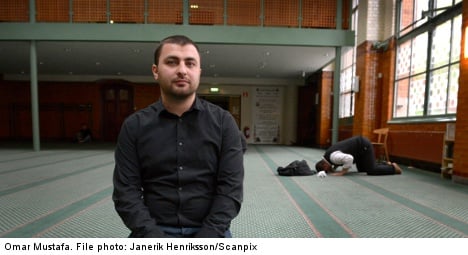“One has to go public and say that you cannot act the way he has done,” Sahlin told the Aftonbladet newspaper.
Sahlin’s comments came after Omar Mustafa was chosen to sit on the governing board of the left-of-centre opposition party at last weekend’s party congress. He is also chairman of the Islamic Association (Islamska förbundet) in Sweden, a group which has invited speakers to Sweden with known anti-Semitic views.
“I cannot state clearly enough that I distance myself from all anti-Semitism, everything that would qualify as racial agitation, or that would collectively condemn the Jewish community,” he told the TT news agency.
But Mustafa’s claims are not good enough for Willy Silberstein, chairman of the Swedish Committee Against Antisemitism (Svenska kommittén mot antisemitism – SKMA.)
“No, I don’t think it does. When you are an established organization and invite speakers, you give them legitimacy,” Silberstein told The Local.
“It’s the same when Islamophobes invite haters from Britain. You have to say no to racism regardless of where it comes from.”
It was the Swedish anti-racism magazine Expo, known internationally as the publication of Millennium trilogy author Stieg Larsson, that revealed that one speaker invited by Mustafa, Egyptian Salah Sultan, has previously slandered the Jewish community in an interview with al-Jazeera by saying they kill Christians at Easter. Another speaker invited by the Swedish Islamic group, Ragheb Al-Serjany, has publicly said Jews control the international media.
SEE ALSO: Swedish Defence League demo sparks violent protest
As the political storm brewed, Social Democrat party secretary Carin Jämtin said she was convinced that Mustafa respected the party’s views on human rights.
“I think her comment was not sharp enough, it tried to smooth things over,” Silberstein said.
“It’s not my job to say whether they should choose him to sit on the governing board, but I am surprised the Social Democrats picked him. It’s no secret where he stands in this matter.”
Neither does former party leader Sahlin seem to think the top brass is taking the situation seriously enough. On Wednesday, she pondered whether her colleagues did enough research before choosing Mustafa.
“I would be greatly surprised if it turns out they didn’t ask questions about this,” she told Aftonbladet on Wednesday.
“It seems like they’ve been caught out and I find it very worrying.”
On Thursday, the tabloid Expressen published a photograph of Mustafa with Palestinian visitor Azzam Tamimi, who they say has given voice to anti-Semitic views in the past. The newspaper claims the photograph was taken at a conference in December of 2011.
The Moderate Party MP Abdirizak Waberi reportedly also attended the event.
“A lot of people in Sweden say that we don’t have anti-Semitism here, but we do,” Silberstein told The Local.
“The fundamental problem is mixing up Jewish Swedes with Israel, as though Swedish citizens can be held accountable for what another country does.”
Ann Törnkvist




 Please whitelist us to continue reading.
Please whitelist us to continue reading.
Member comments